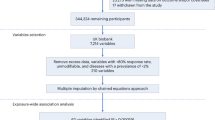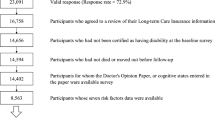Abstract
Dementia constitutes a worldwide concern. To characterize the age- and sex-specific modifiable risk factor profiles of dementia, we included 497,401 UK Biobank participants (mean age = 56.5 years) without dementia at baseline (2006–2010) and followed them until March 2021. Cox proportional hazard models were used to estimate the age- and sex-specific hazard ratios (HRs) of incident dementia associated with socioeconomic (less education and high Townsend deprivation index), lifestyle (non-moderate alcohol intake, current smoking, suboptimal diet, physical inactivity, and unhealthy sleep duration), and health condition factors (hypertension, diabetes, cardiovascular diseases, and depressive symptoms). We also calculated the population attributable fractions (PAFs) of these factors. During follow-up (mean = 11.6 years), we identified 6564 dementia cases. HRs for the risk factors were similar between the sexes, while most factors showed stronger associations among younger participants. For example, the HRs of smoking were 1.74 (95% CI: 1.23, 2.47) for individuals aged < 50 years, and 1.18 (1.05, 1.33) for those aged ≥ 65 years. Overall, 46.8% (37.4%, 55.2%) of dementia cases were attributable to the investigated risk factors. The PAFs of the investigated risk factors also decreased with age, but that for health condition risk factors decreased with lower magnitude than socioeconomic and lifestyle risk factors. The stronger associations and greater PAFs of several modifiable risk factors for dementia among younger adults than older participants underscored the importance of dementia prevention from an earlier stage across the adult life course.



Similar content being viewed by others
Data availability
Data used in this study from the UK Biobank are all available upon application (www.ukbiobank.ac.uk/).
Abbreviations
- BMI:
-
Body mass index
- HR:
-
Hazard ratio
- CI:
-
Confidence interval
- PAF:
-
Population attributable fraction
- TDI:
-
Townsend deprivation index
- UKB:
-
UK Biobank
- CVD:
-
Cardiovascular disease
- RS:
-
Risk score
References
Global status report on the public health response to dementia [Internet]. [date unknown];[cited 2021 Oct 20 ] Available from: https://www.who.int/publications/i/item/9789240033245.
GBD 2019 Dementia Forecasting Collaborators. Estimation of the global prevalence of dementia in 2019 and forecasted prevalence in 2050: an analysis for the Global Burden of Disease Study 2019. Lancet Public Health. 2022 Feb;7(2):e105-e125
Vos T, Lim SS, Abbafati C, et al. Global burden of 369 diseases and injuries in 204 countries and territories, 1990–2019: a systematic analysis for the Global Burden of Disease Study 2019. The Lancet. 2020;396(10258):1204–22.
Xu J, Zhang Y, Qiu C, Cheng F. Global and regional economic costs of dementia: a systematic review. The Lancet. 2017;390:S47.
Alexander GC, Emerson S, Kesselheim AS. Evaluation of Aducanumab for Alzheimer disease: scientific evidence and regulatory review involving efficacy, safety, and futility. JAMA. 2021;325(17):1717–8.
Knopman DS, Jones DT, Greicius MD. Failure to demonstrate efficacy of aducanumab: An analysis of the EMERGE and ENGAGE trials as reported by Biogen, December 2019. Alzheimer’s & Dementia. 2021;17(4):696–701.
Livingston G, Huntley J, Sommerlad A, et al. Dementia prevention, intervention, and care: 2020 report of the Lancet Commission. The Lancet. 2020;396(10248):413–46.
Cao L, Tan L, Wang H-F, et al. Dietary patterns and risk of dementia: a systematic review and meta-analysis of cohort studies. Mol Neurobiol. 2016;53(9):6144–54.
Chen J-C, Espeland MA, Brunner RL, et al. Sleep duration, cognitive decline, and dementia risk in older women. Alzheimer’s & Dementia. 2016;12(1):21–33.
Palpatzis E, Bass N, Jones R, Mukadam N. Longitudinal association of apolipoprotein E and sleep with incident dementia. Alzheimer’s & Dementia. 2021;18:888–98.
van Oijen M, de Jong FJ, Hofman A, et al. Subjective memory complaints, education, and risk of Alzheimer’s disease. Alzheimer’s & Dementia. 2007;3(2):92–7.
Sharp SI, Aarsland D, Day S, et al. Hypertension is a potential risk factor for vascular dementia: systematic review. Int J Geriatr Psychiatry. 2011;26(7):661–9.
Bycroft C, Freeman C, Petkova D, et al. The UK Biobank resource with deep phenotyping and genomic data. Nature. 2018;562(7726):203–9.
Meng X, D’Arcy C. Education and dementia in the context of the cognitive reserve hypothesis: a systematic review with meta-analyses and qualitative analyses. PLoS ONE. 2012;7(6): e38268.
Beydoun MA, Beydoun HA, Gamaldo AA, et al. Epidemiologic studies of modifiable factors associated with cognition and dementia: systematic review and meta-analysis. BMC Public Health. 2014;14(1):643.
Russ TC, Stamatakis E, Hamer M, et al. Socioeconomic status as a risk factor for dementia death: individual participant meta-analysis of 86 508 men and women from the UK. Br J Psychiatry. 2013;203(1):10–7.
Anstey KJ, Mack HA, Cherbuin N. Alcohol consumption as a risk factor for dementia and cognitive decline: meta-analysis of prospective studies. Am J Geriatr Psychiatry. 2009;17(7):542–55.
Blondell SJ, Hammersley-Mather R, Veerman JL. Does physical activity prevent cognitive decline and dementia?: A systematic review and meta-analysis of longitudinal studies. BMC Public Health. 2014;14(1):510.
Zhong G, Wang Y, Zhang Y, et al. Smoking is associated with an increased risk of dementia: a meta-analysis of prospective cohort studies with investigation of potential effect modifiers. PLoS ONE. 2015;10(3): e0118333.
Morris R, Carstairs V. Which deprivation? A comparison of selected deprivation indexes. J Public Health. 1991;13(4):318–26.
Pearce M, Strain T, Kim Y, et al. Estimating physical activity from self-reported behaviours in large-scale population studies using network harmonisation: findings from UK Biobank and associations with disease outcomes. Int J Behav Nutr Phys Act. 2020;17(1):40.
Bradbury KE, Young HJ, Guo W, Key TJ. Dietary assessment in UK Biobank: an evaluation of the performance of the touchscreen dietary questionnaire. J Nutr Sci. 2018;7: e6.
Lourida I, Hannon E, Littlejohns TJ, et al. Association of lifestyle and genetic risk with incidence of dementia. JAMA. 2019;322(5):430–7.
Dietary Guidelines for Americans, 2020–2025 [Internet]. [date unknown];Available from: https://www.dietaryguidelines.gov/sites/default/files/2021-03/Dietary_Guidelines_for_Americans-2020-2025.pdf.
Mozaffarian D. Dietary and policy priorities for cardiovascular disease, diabetes, and obesity. Circulation. 2016;133(2):187–225.
Lloyd-Jones DM, Hong Y, Labarthe D, et al. Defining and setting national goals for cardiovascular health promotion and disease reduction. Circulation. 2010;121(4):586–613.
Hirshkowitz M, Whiton K, Albert SM, et al. National Sleep Foundation’s sleep time duration recommendations: methodology and results summary. Sleep Health J Natl Sleep Found. 2015;1(1):40–3.
Wang T, Zhao Z, Yu X, et al. Age-specific modifiable risk factor profiles for cardiovascular disease and all-cause mortality: a nationwide, population-based, prospective cohort study. Lancet Reg Health Western Pacific. 2021;17:100277.
Wang T, Zhao Z, Wang G, et al. Age-related disparities in diabetes risk attributable to modifiable risk factor profiles in Chinese adults: a nationwide, population-based, cohort study. Lancet Heal Long. 2021;2(10):e618–28.
Tromp J, Paniagua SMA, Lau ES, et al. Age dependent associations of risk factors with heart failure: pooled population based cohort study. BMJ. 2021;372: n461.
Anjum I, Fayyaz M, Wajid A, et al. Does obesity increase the risk of dementia: a literature review. Cureus. 2018;10(5):e2660.
Floud S, Simpson RF, Balkwill A, et al. Body mass index, diet, physical inactivity, and the incidence of dementia in 1 million UK women. Neurology. 2020;94(2):e123–32.
Harshfield EL, Pennells L, Schwartz JE, et al. Association between depressive symptoms and incident cardiovascular diseases. JAMA. 2020;324(23):2396–405.
van de Vorst IE, Koek HL, de Vries R, et al. Effect of vascular risk factors and diseases on mortality in individuals with dementia: a systematic review and meta-analysis. J Am Geriatr Soc. 2016;64(1):37–46.
Xue M, Xu W, Ou Y-N, et al. Diabetes mellitus and risks of cognitive impairment and dementia: a systematic review and meta-analysis of 144 prospective studies. Ageing Res Rev. 2019;55: 100944.
Kuźma E, Lourida I, Moore SF, et al. Stroke and dementia risk: a systematic review and meta-analysis. Alzheimer’s & Dementia. 2018;14(11):1416–26.
Wolters FJ, Segufa RA, Darweesh SKL, et al. Coronary heart disease, heart failure, and the risk of dementia: a systematic review and meta-analysis. Alzheimer’s & Dementia. 2018;14(11):1493–504.
Jorm AF. History of depression as a risk factor for dementia: an updated review. Aust N Z J Psychiatry. 2001;35(6):776–81.
Wilkinson T, Schnier C, Bush K, et al. Identifying dementia outcomes in UK Biobank: a validation study of primary care, hospital admissions and mortality data. Eur J Epidemiol. 2019;34(6):557–65.
Dahlqwist E, Zetterqvist J, Pawitan Y, Sjölander A. Model-based estimation of the attributable fraction for cross-sectional, case–control and cohort studies using the R package AF. Eur J Epidemiol. 2016;31(6):575–82.
Rockhill B, Newman B, Weinberg C. Use and misuse of population attributable fractions. Am J Public Health. 1998;88(1):15–9.
Scheike TH, Zhang M-J. Analyzing competing risk data using the R timereg package. J Stat Softw. 2011;38(2): i02.
van Buuren S, Groothuis-Oudshoorn K. Mice: multivariate imputation by chained equations in R. J Stat Softw. 2011;45:1–67.
Ludbrook J. Multiple comparison procedures updated. Clin Exp Pharmacol Physiol. 1998;25(12):1032–7.
Xu W, Qiu C, Gatz M, et al. Mid- and late-life diabetes in relation to the risk of dementia: a population-based twin study. Diabetes. 2009;58(1):71–7.
Gąsecki D, Kwarciany M, Nyka W, Narkiewicz K. Hypertension, brain damage and cognitive decline. Curr Hypertens Rep. 2013;15(6):547–58.
Brettschneider J, Tredici KD, Lee VM-Y, Trojanowski JQ. Spreading of pathology in neurodegenerative diseases: a focus on human studies. Nat Rev Neurosci. 2015;16(2):109–20.
Morris MC. Nutrition and risk of dementia: overview and methodological issues: Nutrition and dementia. Ann NY Acad Sci. 2016;1367(1):31–7.
Morris MC, Tangney CC. Dietary fat composition and dementia risk. Neurobiol Aging. 2014;35:S59–64.
Coley N, Andrieu S, Gardette V, et al. Dementia prevention: methodological explanations for inconsistent results. Epidemiol Rev. 2008;30(1):35–66.
Acknowledgements
Data share statement This research was conducted using the UK Biobank (UKB) (Application Number 55005). Data and codebooks used in this study are all available upon application (www.ukbiobank.ac.uk/). The authors thank the participants of the UKB for their contributions to this work.
Funding
This work was supported by the Zhejiang University Global Partnership Fund (Granted to CY), the National Science Fund for Excellent Young Scholars (81922060, Granted to GZ), and the Talent Introduction Program of the Chinese Academy of Sciences (Granted to GZ). The funding agencies had no role in study design, data collection, analysis, decision to publish, or manuscript preparation.
Author information
Authors and Affiliations
Contributions
CY, GZ, and HC designed the study; HC performed the statistical analyses; HC drafted and YM, YC, WX, and GZ revised the manuscript; CY supervised the data analysis and interpretation; CY had the primary responsibility for the final content. All authors critically reviewed the manuscript and approved the final draft.
Corresponding authors
Ethics declarations
Competing interests
The authors declare that they have no competing interests.
Human and animals rights
Patient and Public Involvement Patients or the public were not involved in the design, or conduct, or reporting, or dissemination plans of our research.
Additional information
Publisher's Note
Springer Nature remains neutral with regard to jurisdictional claims in published maps and institutional affiliations.
Supplementary Information
Below is the link to the electronic supplementary material.
Rights and permissions
Springer Nature or its licensor (e.g. a society or other partner) holds exclusive rights to this article under a publishing agreement with the author(s) or other rightsholder(s); author self-archiving of the accepted manuscript version of this article is solely governed by the terms of such publishing agreement and applicable law.
About this article
Cite this article
Chen, H., Cao, Y., Ma, Y. et al. Age- and sex-specific modifiable risk factor profiles of dementia: evidence from the UK Biobank. Eur J Epidemiol 38, 83–93 (2023). https://doi.org/10.1007/s10654-022-00952-8
Received:
Accepted:
Published:
Issue Date:
DOI: https://doi.org/10.1007/s10654-022-00952-8




